Legal Aspects of Business: Director's Duty and Companies Act 2006
VerifiedAdded on 2023/01/11
|6
|1233
|39
Report
AI Summary
This report delves into the legal aspects of a business, specifically focusing on the duties of a director within a company, as outlined in Section 171 of the Companies Act 2006. The report critically discusses the 'Duty to act within powers,' emphasizing the legal implications of directors exceeding their authority and failing to adhere to the company's Articles of Association. It references relevant legislation and case law, such as Re Smith v/s Fawcett and Punt v Symons, to illustrate the consequences of non-compliance, including potential legal action and personal liability for damages. The report underscores the importance of directors acting in good faith and within the scope of their appointed duties, highlighting the significance of this duty in maintaining corporate governance and preventing fraudulent activities. The conclusion reinforces the critical nature of directors' adherence to their powers and duties within the legal framework of the Companies Act.
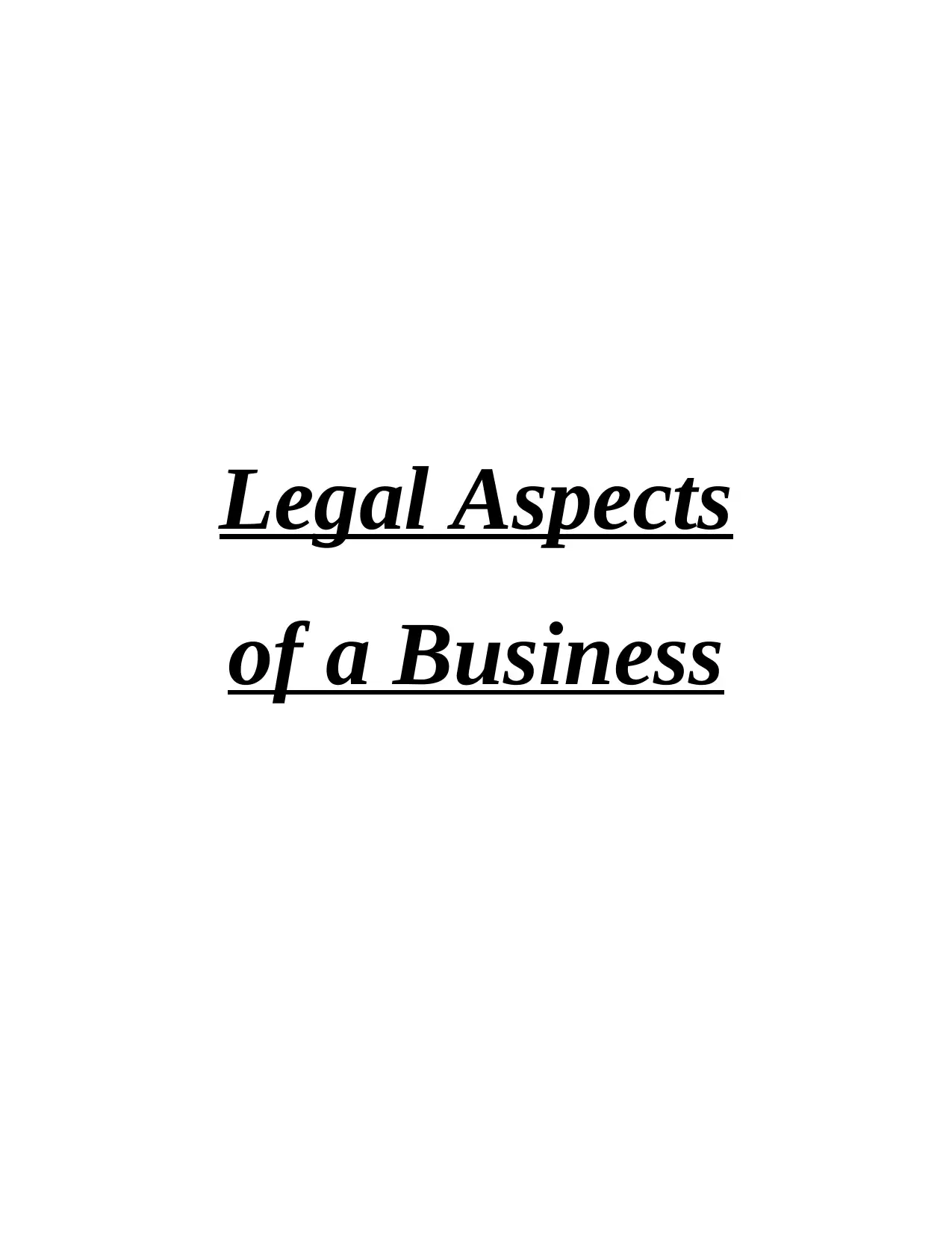
Legal Aspects
of a Business
of a Business
Paraphrase This Document
Need a fresh take? Get an instant paraphrase of this document with our AI Paraphraser
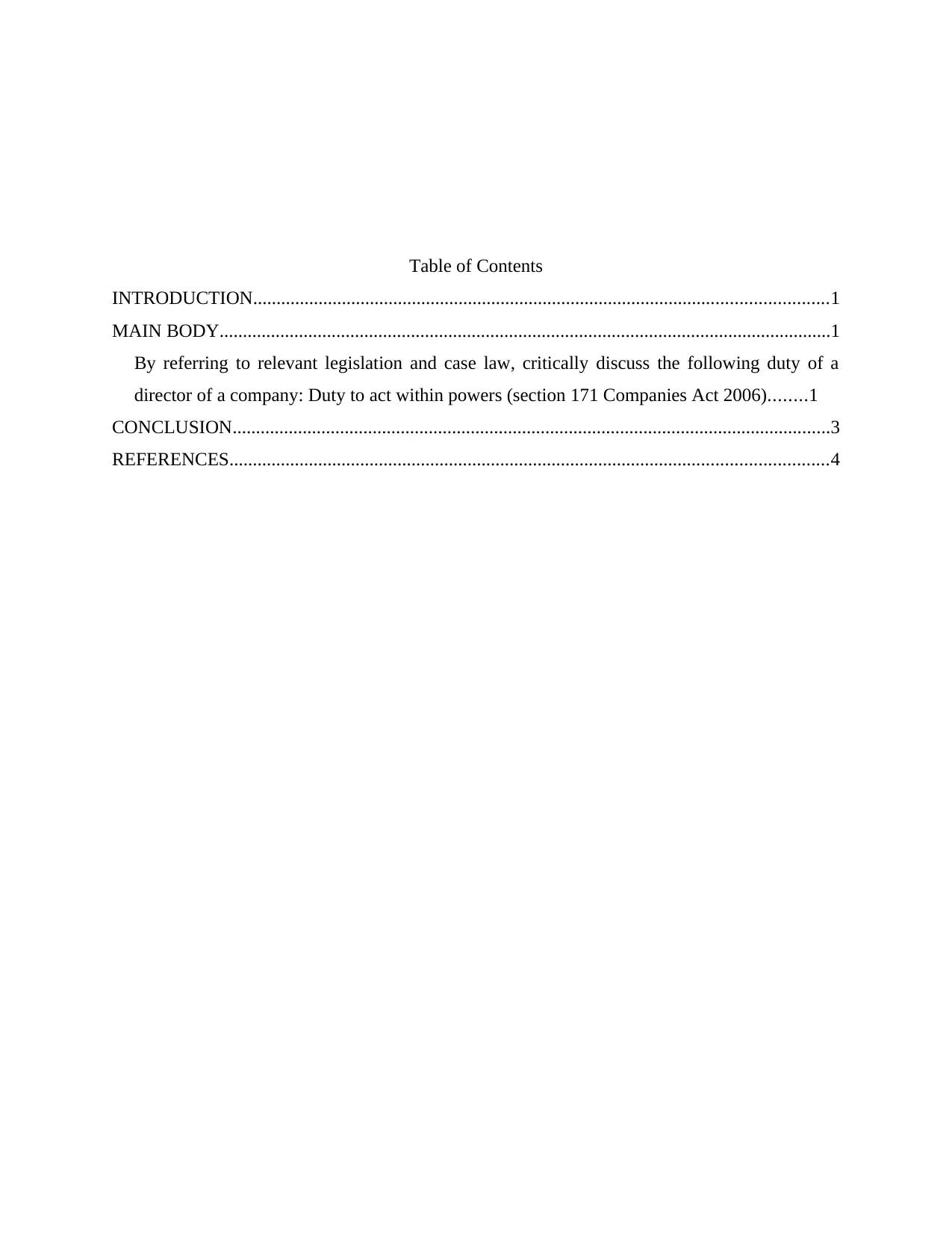
Table of Contents
INTRODUCTION...........................................................................................................................1
MAIN BODY...................................................................................................................................1
By referring to relevant legislation and case law, critically discuss the following duty of a
director of a company: Duty to act within powers (section 171 Companies Act 2006)........1
CONCLUSION................................................................................................................................3
REFERENCES................................................................................................................................4
INTRODUCTION...........................................................................................................................1
MAIN BODY...................................................................................................................................1
By referring to relevant legislation and case law, critically discuss the following duty of a
director of a company: Duty to act within powers (section 171 Companies Act 2006)........1
CONCLUSION................................................................................................................................3
REFERENCES................................................................................................................................4
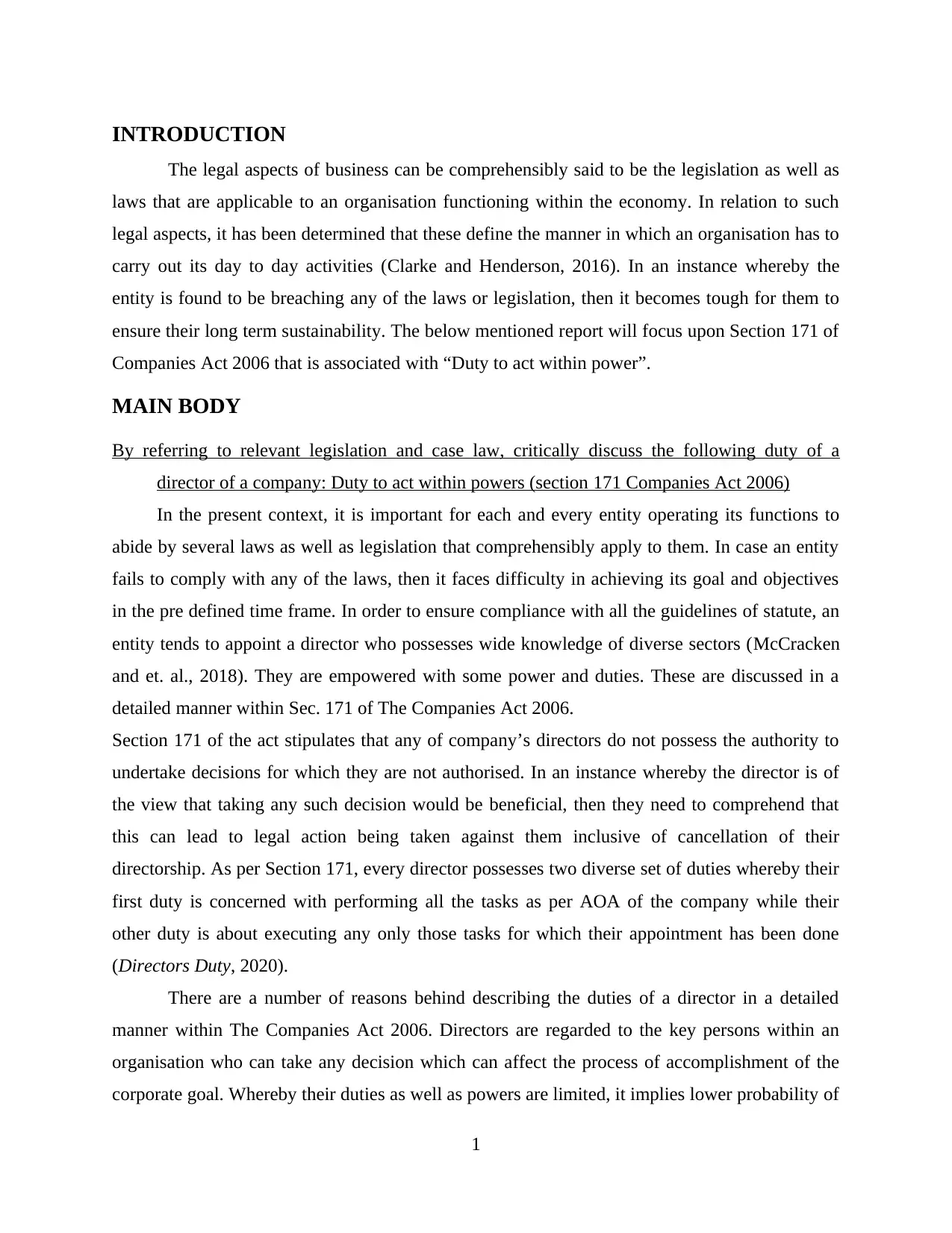
INTRODUCTION
The legal aspects of business can be comprehensibly said to be the legislation as well as
laws that are applicable to an organisation functioning within the economy. In relation to such
legal aspects, it has been determined that these define the manner in which an organisation has to
carry out its day to day activities (Clarke and Henderson, 2016). In an instance whereby the
entity is found to be breaching any of the laws or legislation, then it becomes tough for them to
ensure their long term sustainability. The below mentioned report will focus upon Section 171 of
Companies Act 2006 that is associated with “Duty to act within power”.
MAIN BODY
By referring to relevant legislation and case law, critically discuss the following duty of a
director of a company: Duty to act within powers (section 171 Companies Act 2006)
In the present context, it is important for each and every entity operating its functions to
abide by several laws as well as legislation that comprehensibly apply to them. In case an entity
fails to comply with any of the laws, then it faces difficulty in achieving its goal and objectives
in the pre defined time frame. In order to ensure compliance with all the guidelines of statute, an
entity tends to appoint a director who possesses wide knowledge of diverse sectors (McCracken
and et. al., 2018). They are empowered with some power and duties. These are discussed in a
detailed manner within Sec. 171 of The Companies Act 2006.
Section 171 of the act stipulates that any of company’s directors do not possess the authority to
undertake decisions for which they are not authorised. In an instance whereby the director is of
the view that taking any such decision would be beneficial, then they need to comprehend that
this can lead to legal action being taken against them inclusive of cancellation of their
directorship. As per Section 171, every director possesses two diverse set of duties whereby their
first duty is concerned with performing all the tasks as per AOA of the company while their
other duty is about executing any only those tasks for which their appointment has been done
(Directors Duty, 2020).
There are a number of reasons behind describing the duties of a director in a detailed
manner within The Companies Act 2006. Directors are regarded to the key persons within an
organisation who can take any decision which can affect the process of accomplishment of the
corporate goal. Whereby their duties as well as powers are limited, it implies lower probability of
1
The legal aspects of business can be comprehensibly said to be the legislation as well as
laws that are applicable to an organisation functioning within the economy. In relation to such
legal aspects, it has been determined that these define the manner in which an organisation has to
carry out its day to day activities (Clarke and Henderson, 2016). In an instance whereby the
entity is found to be breaching any of the laws or legislation, then it becomes tough for them to
ensure their long term sustainability. The below mentioned report will focus upon Section 171 of
Companies Act 2006 that is associated with “Duty to act within power”.
MAIN BODY
By referring to relevant legislation and case law, critically discuss the following duty of a
director of a company: Duty to act within powers (section 171 Companies Act 2006)
In the present context, it is important for each and every entity operating its functions to
abide by several laws as well as legislation that comprehensibly apply to them. In case an entity
fails to comply with any of the laws, then it faces difficulty in achieving its goal and objectives
in the pre defined time frame. In order to ensure compliance with all the guidelines of statute, an
entity tends to appoint a director who possesses wide knowledge of diverse sectors (McCracken
and et. al., 2018). They are empowered with some power and duties. These are discussed in a
detailed manner within Sec. 171 of The Companies Act 2006.
Section 171 of the act stipulates that any of company’s directors do not possess the authority to
undertake decisions for which they are not authorised. In an instance whereby the director is of
the view that taking any such decision would be beneficial, then they need to comprehend that
this can lead to legal action being taken against them inclusive of cancellation of their
directorship. As per Section 171, every director possesses two diverse set of duties whereby their
first duty is concerned with performing all the tasks as per AOA of the company while their
other duty is about executing any only those tasks for which their appointment has been done
(Directors Duty, 2020).
There are a number of reasons behind describing the duties of a director in a detailed
manner within The Companies Act 2006. Directors are regarded to the key persons within an
organisation who can take any decision which can affect the process of accomplishment of the
corporate goal. Whereby their duties as well as powers are limited, it implies lower probability of
1
⊘ This is a preview!⊘
Do you want full access?
Subscribe today to unlock all pages.

Trusted by 1+ million students worldwide
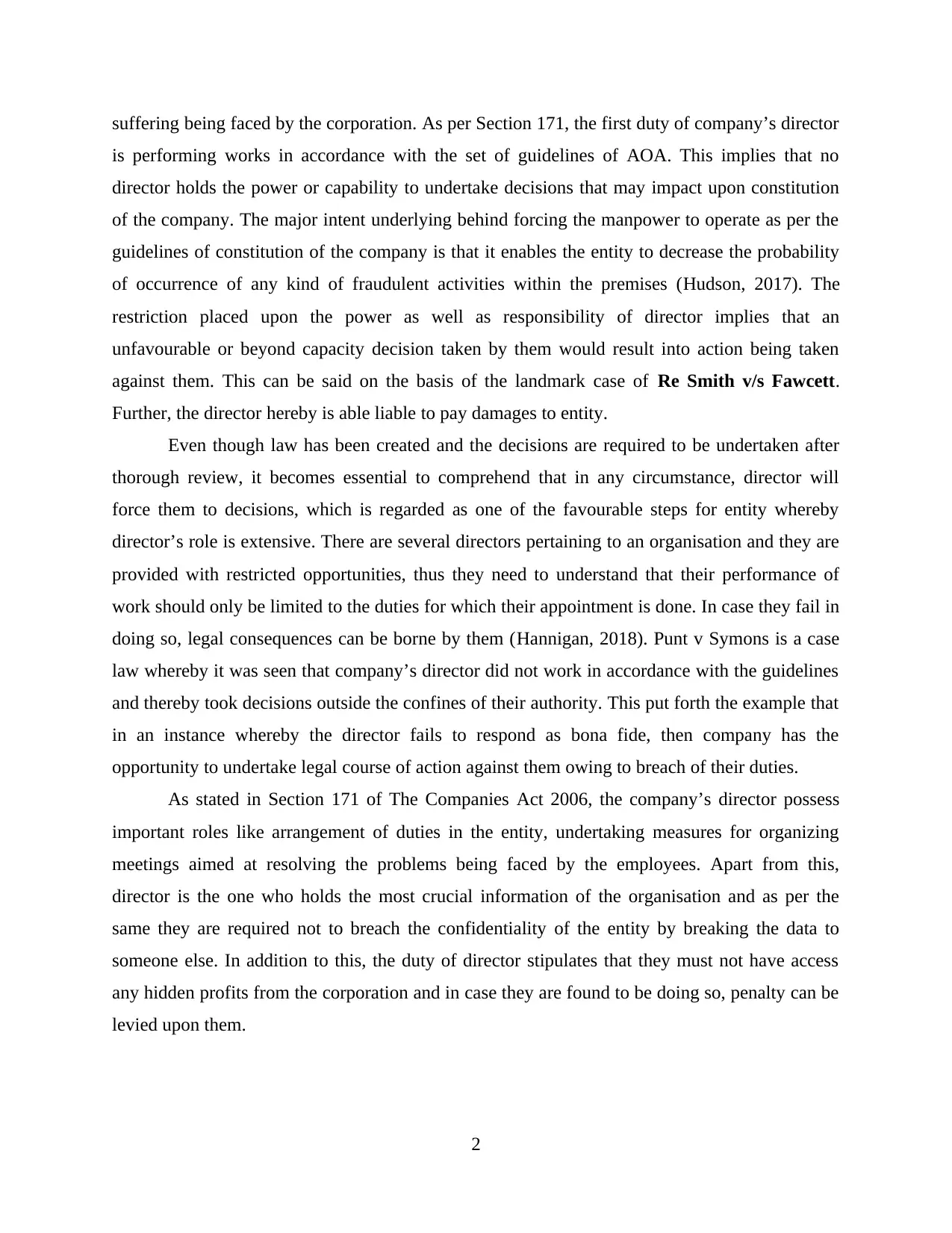
suffering being faced by the corporation. As per Section 171, the first duty of company’s director
is performing works in accordance with the set of guidelines of AOA. This implies that no
director holds the power or capability to undertake decisions that may impact upon constitution
of the company. The major intent underlying behind forcing the manpower to operate as per the
guidelines of constitution of the company is that it enables the entity to decrease the probability
of occurrence of any kind of fraudulent activities within the premises (Hudson, 2017). The
restriction placed upon the power as well as responsibility of director implies that an
unfavourable or beyond capacity decision taken by them would result into action being taken
against them. This can be said on the basis of the landmark case of Re Smith v/s Fawcett.
Further, the director hereby is able liable to pay damages to entity.
Even though law has been created and the decisions are required to be undertaken after
thorough review, it becomes essential to comprehend that in any circumstance, director will
force them to decisions, which is regarded as one of the favourable steps for entity whereby
director’s role is extensive. There are several directors pertaining to an organisation and they are
provided with restricted opportunities, thus they need to understand that their performance of
work should only be limited to the duties for which their appointment is done. In case they fail in
doing so, legal consequences can be borne by them (Hannigan, 2018). Punt v Symons is a case
law whereby it was seen that company’s director did not work in accordance with the guidelines
and thereby took decisions outside the confines of their authority. This put forth the example that
in an instance whereby the director fails to respond as bona fide, then company has the
opportunity to undertake legal course of action against them owing to breach of their duties.
As stated in Section 171 of The Companies Act 2006, the company’s director possess
important roles like arrangement of duties in the entity, undertaking measures for organizing
meetings aimed at resolving the problems being faced by the employees. Apart from this,
director is the one who holds the most crucial information of the organisation and as per the
same they are required not to breach the confidentiality of the entity by breaking the data to
someone else. In addition to this, the duty of director stipulates that they must not have access
any hidden profits from the corporation and in case they are found to be doing so, penalty can be
levied upon them.
2
is performing works in accordance with the set of guidelines of AOA. This implies that no
director holds the power or capability to undertake decisions that may impact upon constitution
of the company. The major intent underlying behind forcing the manpower to operate as per the
guidelines of constitution of the company is that it enables the entity to decrease the probability
of occurrence of any kind of fraudulent activities within the premises (Hudson, 2017). The
restriction placed upon the power as well as responsibility of director implies that an
unfavourable or beyond capacity decision taken by them would result into action being taken
against them. This can be said on the basis of the landmark case of Re Smith v/s Fawcett.
Further, the director hereby is able liable to pay damages to entity.
Even though law has been created and the decisions are required to be undertaken after
thorough review, it becomes essential to comprehend that in any circumstance, director will
force them to decisions, which is regarded as one of the favourable steps for entity whereby
director’s role is extensive. There are several directors pertaining to an organisation and they are
provided with restricted opportunities, thus they need to understand that their performance of
work should only be limited to the duties for which their appointment is done. In case they fail in
doing so, legal consequences can be borne by them (Hannigan, 2018). Punt v Symons is a case
law whereby it was seen that company’s director did not work in accordance with the guidelines
and thereby took decisions outside the confines of their authority. This put forth the example that
in an instance whereby the director fails to respond as bona fide, then company has the
opportunity to undertake legal course of action against them owing to breach of their duties.
As stated in Section 171 of The Companies Act 2006, the company’s director possess
important roles like arrangement of duties in the entity, undertaking measures for organizing
meetings aimed at resolving the problems being faced by the employees. Apart from this,
director is the one who holds the most crucial information of the organisation and as per the
same they are required not to breach the confidentiality of the entity by breaking the data to
someone else. In addition to this, the duty of director stipulates that they must not have access
any hidden profits from the corporation and in case they are found to be doing so, penalty can be
levied upon them.
2
Paraphrase This Document
Need a fresh take? Get an instant paraphrase of this document with our AI Paraphraser
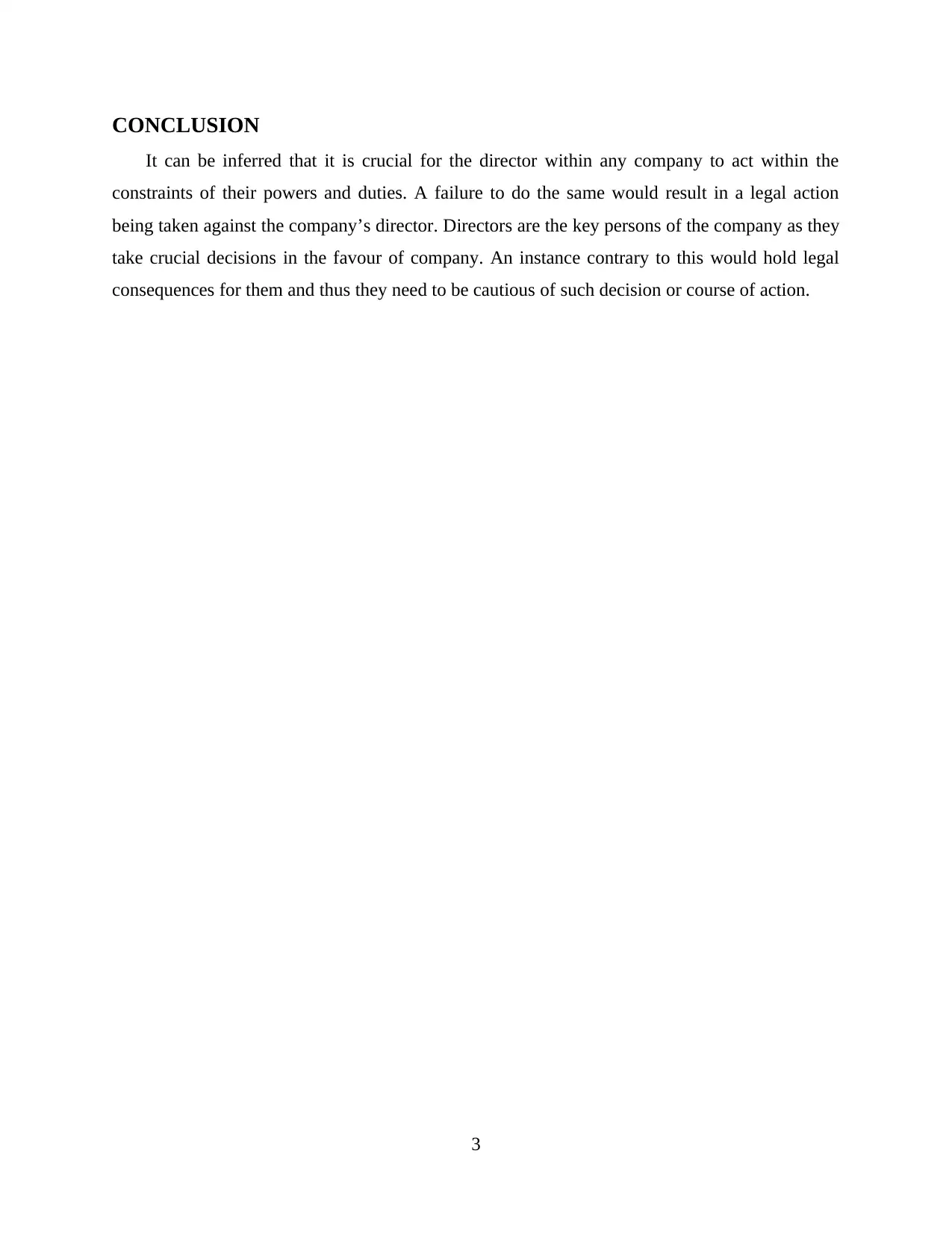
CONCLUSION
It can be inferred that it is crucial for the director within any company to act within the
constraints of their powers and duties. A failure to do the same would result in a legal action
being taken against the company’s director. Directors are the key persons of the company as they
take crucial decisions in the favour of company. An instance contrary to this would hold legal
consequences for them and thus they need to be cautious of such decision or course of action.
3
It can be inferred that it is crucial for the director within any company to act within the
constraints of their powers and duties. A failure to do the same would result in a legal action
being taken against the company’s director. Directors are the key persons of the company as they
take crucial decisions in the favour of company. An instance contrary to this would hold legal
consequences for them and thus they need to be cautious of such decision or course of action.
3
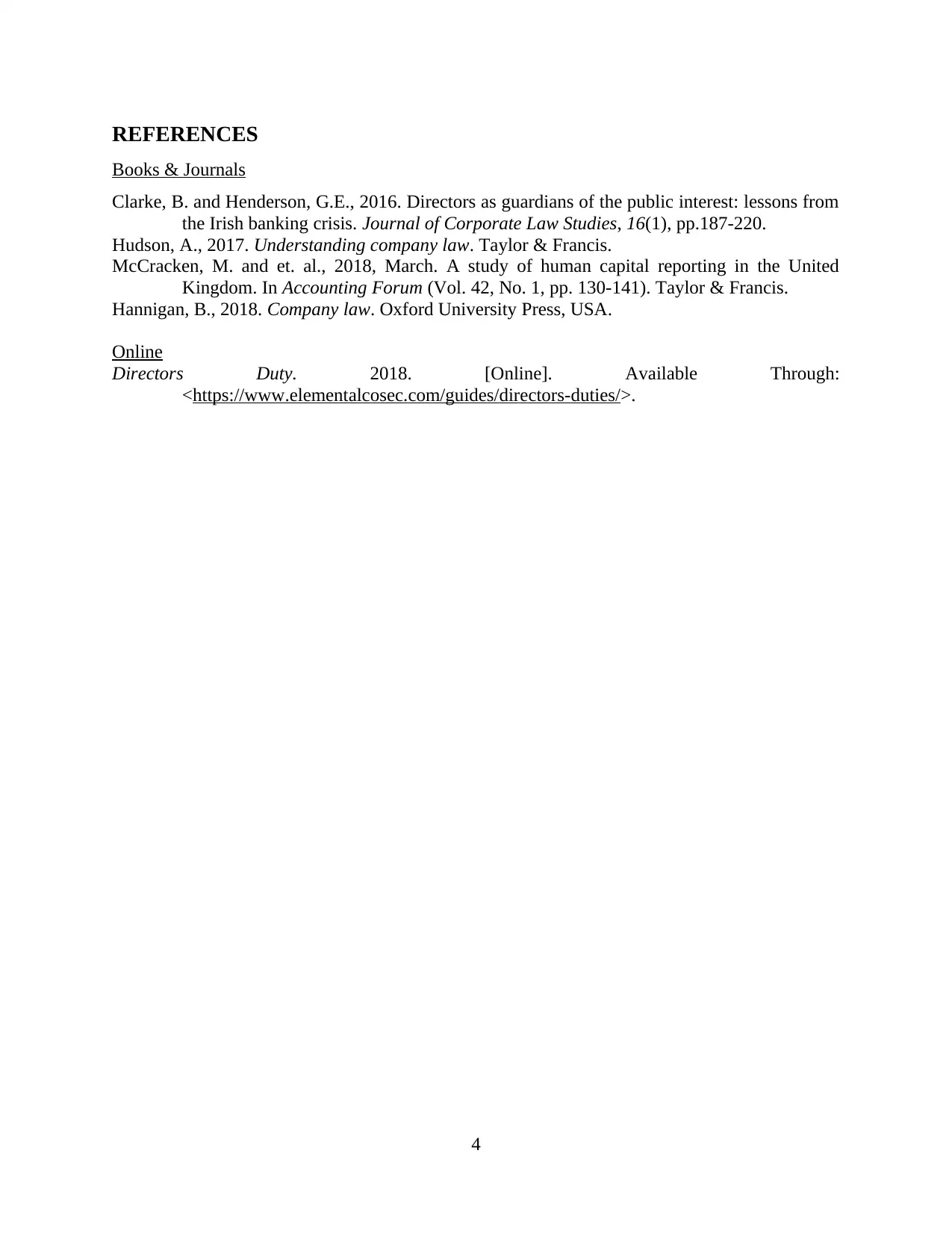
REFERENCES
Books & Journals
Clarke, B. and Henderson, G.E., 2016. Directors as guardians of the public interest: lessons from
the Irish banking crisis. Journal of Corporate Law Studies, 16(1), pp.187-220.
Hudson, A., 2017. Understanding company law. Taylor & Francis.
McCracken, M. and et. al., 2018, March. A study of human capital reporting in the United
Kingdom. In Accounting Forum (Vol. 42, No. 1, pp. 130-141). Taylor & Francis.
Hannigan, B., 2018. Company law. Oxford University Press, USA.
Online
Directors Duty. 2018. [Online]. Available Through:
<https://www.elementalcosec.com/guides/directors-duties/>.
4
Books & Journals
Clarke, B. and Henderson, G.E., 2016. Directors as guardians of the public interest: lessons from
the Irish banking crisis. Journal of Corporate Law Studies, 16(1), pp.187-220.
Hudson, A., 2017. Understanding company law. Taylor & Francis.
McCracken, M. and et. al., 2018, March. A study of human capital reporting in the United
Kingdom. In Accounting Forum (Vol. 42, No. 1, pp. 130-141). Taylor & Francis.
Hannigan, B., 2018. Company law. Oxford University Press, USA.
Online
Directors Duty. 2018. [Online]. Available Through:
<https://www.elementalcosec.com/guides/directors-duties/>.
4
⊘ This is a preview!⊘
Do you want full access?
Subscribe today to unlock all pages.

Trusted by 1+ million students worldwide
1 out of 6
Related Documents
Your All-in-One AI-Powered Toolkit for Academic Success.
+13062052269
info@desklib.com
Available 24*7 on WhatsApp / Email
![[object Object]](/_next/static/media/star-bottom.7253800d.svg)
Unlock your academic potential
Copyright © 2020–2025 A2Z Services. All Rights Reserved. Developed and managed by ZUCOL.





